Announce to the world or quietly make a fortune?
Author: CryptoDavid, Deep Tide TechFlow
As the weekend approaches, the somewhat quiet NFT market has staged a drama akin to the mantis stalking the cicada, unaware of the oriole behind.
NFT tycoon Hanwe (@HanweChang) on Twitter discovered that a bot on Blur was mimicking and following his pricing strategy. He decided to "intensify" the bot and played a trick on it, publicly announcing a profit of 800 ETH (approximately $1.46 million).
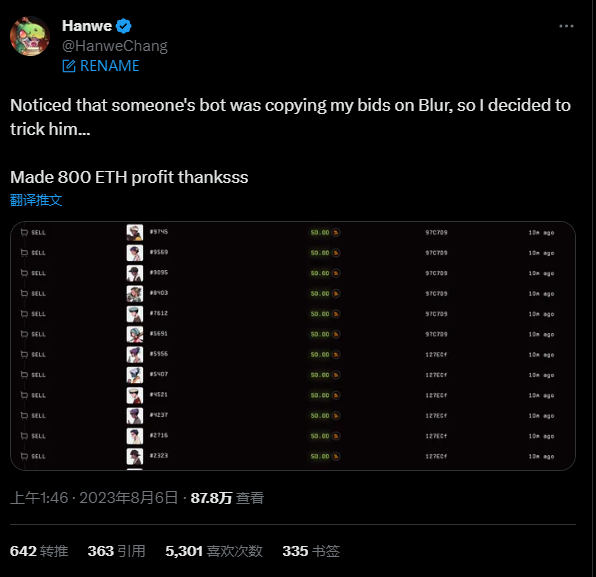
How did he do it?
Those familiar with Blur should know that the platform allows for trait bidding, where users can bid on specific traits within an NFT series, such as Azuki characters with glasses or a white background.
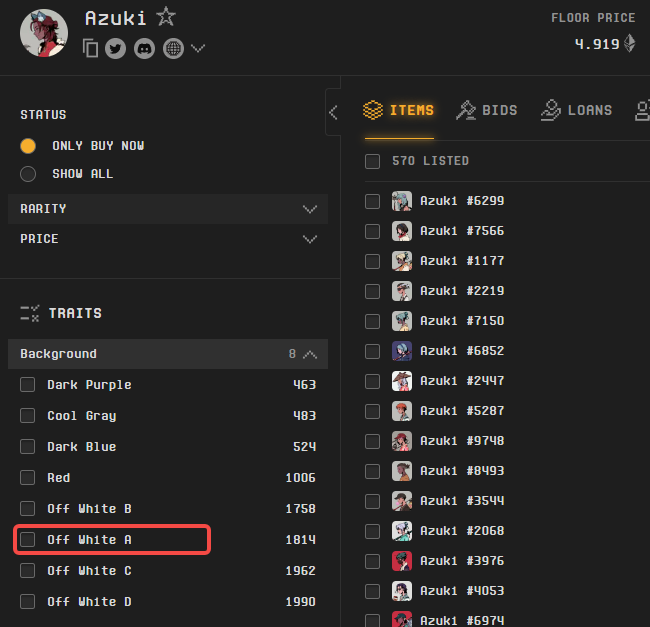
Another well-known figure in the Chinese community, 0xSun (@0xSunNFT), analyzed the sequence of events in Hanwe's bot trickery:
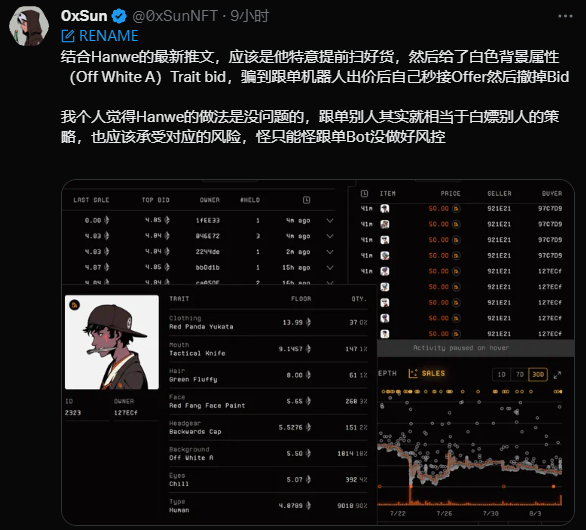
Hanwe realized that the bot was following his pricing strategy, so he set up a trap by placing multiple Azuki items (possibly using another account) and then began the act: he placed a bid of 50 ETH for multiple Azuki items with the background image "Off White A."
Subsequently, the bot automatically followed his bidding strategy and also placed a bid of 50 ETH. At that moment, Hanwe immediately accepted the bot's bid, selling the batch of Azuki NFTs to the bot at a high price of 50 ETH. Simultaneously, the bait bids he had previously placed were retracted.
In simple terms, he bid high on his own items, lured the bot to follow with a high bid, then retracted his bid to profit and leave.
The bot shed no tears. The transaction records of these 12 Azuki items, resulting from this operation, were coldly recorded on the blockchain explorer. The selling prices of each Azuki, when converted to USD, were quite substantial. The owner behind the 0x97 address of the bot was undoubtedly left in a state of despair.
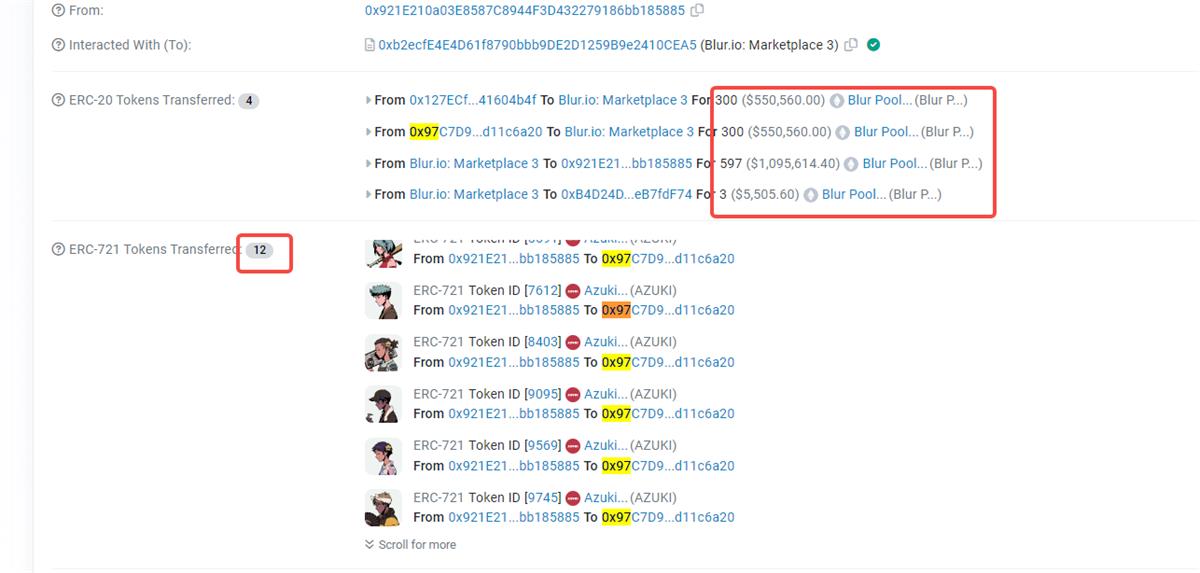
Will you return the "stolen" money?
800 ETH is no small amount.
Just as Hanwe was happily showcasing his bait operation on Twitter, the entity behind 0x97 began to engage in a confrontation.
A Twitter user named elizab.eth left the following comment in the comments section of Hanwe's boastful post:

"We'd like to talk to you about the bounty. If you return 90% of the money you stole from our bot, you can keep 10% as a reward."
Note that the word "stolen" is used in this statement.
The bot followed someone else's strategy, was tricked by someone else, and consequently incurred losses. Is this considered theft? In the real world, such a substantial financial loss and controversial behavior could very well become a legal case.
Hanwe's trickery, while not particularly complex, did exploit the bot's mindless following nature. Morally speaking, it does have a touch of cunning. However, in the crypto world, there are no clear rules to constrain participants' behavior.
If this can be considered theft, then can various futures price manipulations, ancient unplugging of the network cable, and project teams' "sorry, we failed" all be broadly labeled as theft, taking away the chips from the hands of the retail investors?
Or conversely, when a bot successfully profits by following someone else's strategy, has it ever considered sharing some benefits with others?
In this dark forest of Web3, perhaps you cannot simply enjoy the spoils when you are the hunter and cry foul when you are the prey.
Everything comes full circle. Moments of superior skill are inevitably accompanied by moments of inferiority. Especially when there are no rigid regulations and institutional constraints, everything becomes a market behavior of barbarism, disorder, and a willingness to gamble and accept losses.
In elizab's latest tweet, there seems to be a sense of enlightenment:
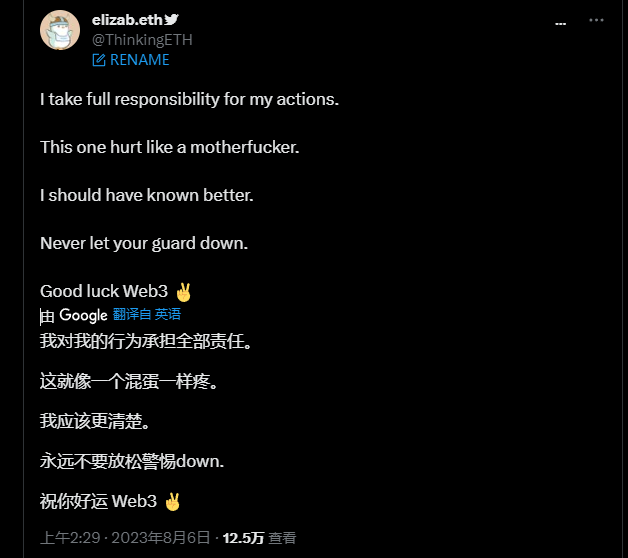
It's just quite ironic that the lessons you've paid for from others, others also have to pay for from someone even higher.
In our Web3, there are many lessons but few teachers.
Announce to the world or quietly make a fortune?
In Hanwe's comments section, some questioned why he would publicly admit to tricking the bot, as it seemed somewhat malicious and the 800 ETH was indeed an enviable figure.
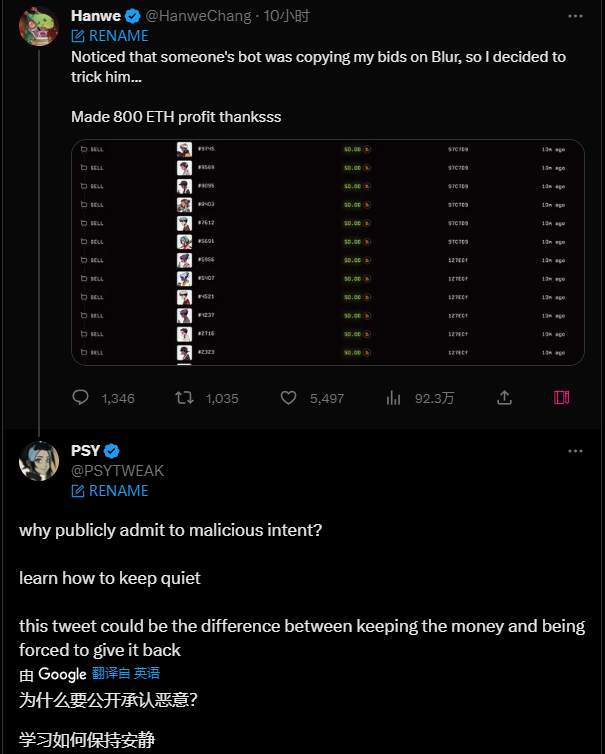
Whether it's showing off or venting, the personal motives and preferences of the tycoon are not the focal point of our discussion. This incident seems to lead to another topic: in Web3, all on-chain transactions and decision-making behaviors seem so transparent, and any action, as long as you want to dig into it, can be publicized to the world;
But as the old saying goes, we still need to learn to quietly make a fortune.
Announce to the world or quietly make a fortune? Interestingly, your quiet fortune-making will be scrutinized by various on-chain detectives, following bots, and ambush attacks from opponents lurking in the shadows, conducting careful research, imitation, and exploitation…
If a quiet fortune-making trading strategy is widely targeted and followed, does it still have the effect of making money?
On the chain, it's full of games. You quietly make a fortune, and I replicate your fortune-making strategy, but it's very likely that you deliberately showed me this strategy…
With layers of tricks and multiple reversals, many times we cannot fully understand a person's true motives through transparent on-chain data.
And this transparency is precisely the arbitrage space left to participants at different levels in Web3:
Third-rate retail investors, believe in transparency;
Second-rate bots, delve into transparency;
First-rate tycoons, exploit transparency.
May every little transparent participant in Web3 walk their path safely.
免责声明:本文章仅代表作者个人观点,不代表本平台的立场和观点。本文章仅供信息分享,不构成对任何人的任何投资建议。用户与作者之间的任何争议,与本平台无关。如网页中刊载的文章或图片涉及侵权,请提供相关的权利证明和身份证明发送邮件到support@aicoin.com,本平台相关工作人员将会进行核查。




